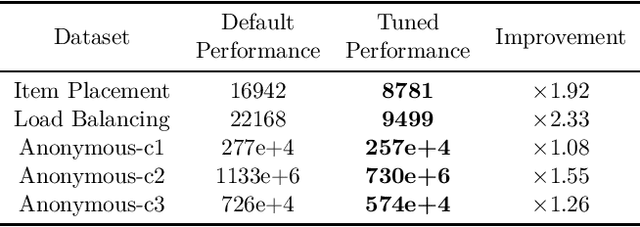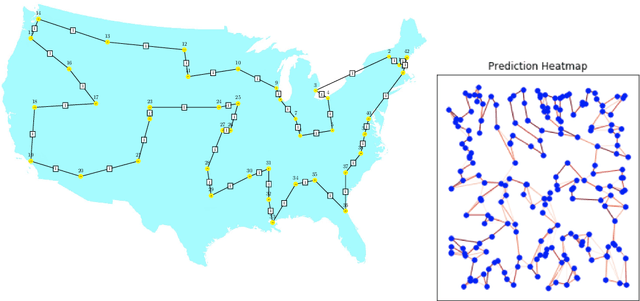Elias Khalil
The Machine Learning for Combinatorial Optimization Competition (ML4CO): Results and Insights
Mar 17, 2022


Abstract:Combinatorial optimization is a well-established area in operations research and computer science. Until recently, its methods have focused on solving problem instances in isolation, ignoring that they often stem from related data distributions in practice. However, recent years have seen a surge of interest in using machine learning as a new approach for solving combinatorial problems, either directly as solvers or by enhancing exact solvers. Based on this context, the ML4CO aims at improving state-of-the-art combinatorial optimization solvers by replacing key heuristic components. The competition featured three challenging tasks: finding the best feasible solution, producing the tightest optimality certificate, and giving an appropriate solver configuration. Three realistic datasets were considered: balanced item placement, workload apportionment, and maritime inventory routing. This last dataset was kept anonymous for the contestants.
Combinatorial optimization and reasoning with graph neural networks
Feb 18, 2021



Abstract:Combinatorial optimization is a well-established area in operations research and computer science. Until recently, its methods have focused on solving problem instances in isolation, ignoring the fact that they often stem from related data distributions in practice. However, recent years have seen a surge of interest in using machine learning, especially graph neural networks (GNNs), as a key building block for combinatorial tasks, either as solvers or as helper functions. GNNs are an inductive bias that effectively encodes combinatorial and relational input due to their permutation-invariance and sparsity awareness. This paper presents a conceptual review of recent key advancements in this emerging field, aiming at both the optimization and machine learning researcher.
Fake News Mitigation via Point Process Based Intervention
Jun 19, 2017



Abstract:We propose the first multistage intervention framework that tackles fake news in social networks by combining reinforcement learning with a point process network activity model. The spread of fake news and mitigation events within the network is modeled by a multivariate Hawkes process with additional exogenous control terms. By choosing a feature representation of states, defining mitigation actions and constructing reward functions to measure the effectiveness of mitigation activities, we map the problem of fake news mitigation into the reinforcement learning framework. We develop a policy iteration method unique to the multivariate networked point process, with the goal of optimizing the actions for maximal total reward under budget constraints. Our method shows promising performance in real-time intervention experiments on a Twitter network to mitigate a surrogate fake news campaign, and outperforms alternatives on synthetic datasets.
 Add to Chrome
Add to Chrome Add to Firefox
Add to Firefox Add to Edge
Add to Edge